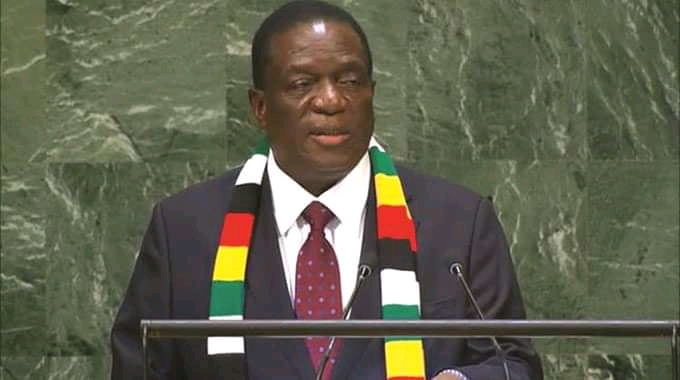President Emmerson Dambudzo Mnangagwa
By Godwin Makoho
President Emmerson Mnangagwa has challenged world leaders to put more effort on tackling the adverse impact of Climate Change.
The world is now warming faster than at any point in recorded history and this has forced the world to come together for action. Warmer temperatures over time are changing weather patterns and disrupting the usual balance of nature. This poses many risks to human beings and all other forms of life on Earth, hence global initiatives aimed at speeding up the pace of climate action.
Speaking at the ongoing 78th Ordinary Session of UN General Assembly in New York on Thursday, president Mnangagwa touched on a number of key issues in Climate change, focussing mainly on what needs to be done in light of mitigation and adaptation as the world battles the global disaster.
Said president Mnangagwa : “Building resilience and tackling the adverse impact of climate change should be an urgent priority for us all. In the case of Zimbabwe and the Southern African Region, floods and droughts have affected the livelihoods of many, while hindering progress on national development.”
President Mnangagwa called the leaders to adopt action orientated approach to the global disaster as opposed to leap service.
“There is need for concrete climate action, as opposed to mere promises, so that we strengthen our adaption, resilience and mitigation mechanisms.
“We must transition to a low-carbon and resilient global economy by increasing investments in renewable energy, sustainable agriculture and green infrastructure,” he said.
“Commitments made under the United Nations Framework Convention on Climate Change and the Paris Agreement must be honoured to deliver climate justice. It is our hope that progress will be made to operationalize the Loss and Damage Fund,” added president Mnangagwa.
Zimbabwe is implementing a Climate Change Policy and Response Strategy while disaster management and early warning systems continue to be strengthened.
The vision of Zimbabwe’s Climate Change Response Strategy is to create a climate change resilient nation while its mission is to ensure sustainable development and a climate proofed economy through engaging all stakeholders recognizing the vulnerable nature of Zimbabwe’s natural resources and society.
Climate change effects permeate all the socio-economic development sectors therefore a need for the collective interventions by governments, development partners and individuals on mitigation and adaptation actions.
President Mnangagwa urged the General Assembly to unlock financial opportunities for developing countries so that they could be able to deal with climate change related challenges.
“The need to reform global financial institutions is of essence to unlock funding for developing countries. The current exclusionary architecture, dominated by a few States, is failing to deliver the requisite resources for countries to finance their developmental priorities and other pressing health and environmental challenges,” said president Mnangagwa.
Libya and Morroco were recently affected by climate change related disasters which resulted in thousands of deaths and president Mnangagwa took the opportunity to pay condolences to the North African countries.
“May I express my deepest condolences and sympathies to the Government and peoples of the Kingdom of Morocco and the State of Libya on the recent loss of lives as a result of the devastating impact of climate change,” said president Mnangagwa.


